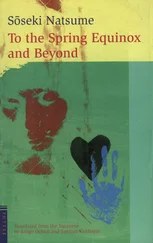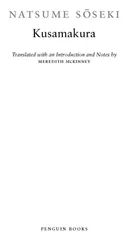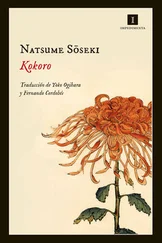“Only because you’re a lousy shot — if your aim is bad you won’t hit anything whatever gun you use.”
“Then will you shoot a sparrow for me? When we get home?” It seemed clear to Tsuda that he would be pressed to make good on any promise he recklessly offered, so he said something vague and changed the subject. Makoto reeled off a string of names unknown to him — Toda, Shibuya, Sakaguchi — and began critiquing his friends one after the other.
“That Okamoto is no fair. He gets them to buy him three pairs of shoes.”
The conversation returned to shoes. The Okamoto boy whom Makoto was criticizing was the son of a family with a deep connection to O-Nobu. Tsuda reflected in silence on a comparison of the two children.
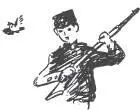 “YOU PLAY at Okamoto’s place these days?”
“YOU PLAY at Okamoto’s place these days?”
“Nope.”
“You had another fight?”
“We didn’t fight.”
“Then why don’t you play?”
“Just don’t.”
It appeared that Makoto had more to say, and Tsuda wanted to know what it was.
“Don’t they give you all sorts of stuff when you go there?”
“Nope — not that much.”
“But they treat you—”
“We had rice curry last time, and it was too spicy.”
Spicy curry seemed an inadequate reason not to visit the Okamotos.
“That can’t be why you don’t like going there.”
“It’s not me — Father says I shouldn’t. I’d like to go and use the swing.”
Tsuda inclined his head in thought. What reason could his uncle have for preferring his son not to visit the Okamotos? A difference in sensibility, in family traditions, in lifestyle — all these occurred immediately. His uncle spent his days at his desk promulgating his vehement views with words in silence and wasn’t nearly as powerful in the actual world as with his pen. Secretly he was sensible of this discrepancy, and his perception had made him obstinate and somewhat reclusive. In that part of himself that feared venturing into a society where wealth and authority were paramount and being made a fool of by others, he appeared to be ceaselessly vigilant against the awful possibility that even the smallest corner of his personal domain should be contaminated by their values.
“Why don’t you ask your father what’s wrong with going to the Okamotos’?”
“I did—”
“What did he say? He didn’t say anything, right?”
“He did!”
“What?”
Makoto appeared a little embarrassed. Presently he stammered a reply in a somber tone of voice.
“He said if I go to Okamotos’ I’ll see, you know, all of Hajime’s things and come home and want, you know, the same stuff for myself. He says I’ll start pestering him to buy me things so I shouldn’t go over there—”
Now Tsuda saw the point. One family lived somewhat better than the other, and the difference in their wealth had to be reflected even in their children’s toys.
“So you only bother your old man about expensive stuff, cars and kid-leather shoes and lord knows what, things you saw first at Hajime’s house — whatever he has goes to the top of your shopping list, is that it?”
Half teasingly, Tsuda lifted a hand and tried clapping Makoto on the back. Makoto screwed his face into an expression that suggested an adult who has had an unattractive truth about himself exposed. Unlike an adult, he offered nothing in the way of self-justification.
“That’s a dirty lie.”
Pressing against his side the one-yen, fifty-sen air gun he had wheedled out of Tsuda, he took off in the direction of home. The marbles in his pocket clinked like prayer beads being vigorously fingered. From his backpack issued a bumping as of textbooks, perhaps, against a lunch box.
Pausing at a black board fence at the corner, he darted a glance back at Tsuda like a weasel and disappeared down the alley. Tsuda had traversed the alley and was stepping through Fujii’s gate at the far end when the bang of a gun sounded just yards ahead of him. With an uncomfortable smile he observed Makoto’s shadowed figure taking careful aim at him through the hedge fence on the right.
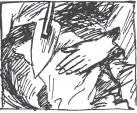 TSUDA HEARD his uncle’s voice in conversation with someone in the formal drawing room and, noticing through the lattice bars a pair of visitor’s shoes, turned away from the main entrance at once, without opening the front door, and made his way around the house toward the sitting room. The garden that might have been at one time a nursery was neither protected by a wooden gate nor enclosed inside a bamboo fence, so one had only to circumvent the kitchen entrance to a rental house that recently had been erected on the same property to reach the far end of the engawa that ran the length of the house on this side. Passing two or three tall tea bushes that were nonetheless a bit low to afford privacy, and beneath the persimmon tree that remained always vivid in his memory, he discerned his aunt’s figure in its customary place. As a reflection of her profile appeared in the glass set into the shoji, he called to her from outside.
TSUDA HEARD his uncle’s voice in conversation with someone in the formal drawing room and, noticing through the lattice bars a pair of visitor’s shoes, turned away from the main entrance at once, without opening the front door, and made his way around the house toward the sitting room. The garden that might have been at one time a nursery was neither protected by a wooden gate nor enclosed inside a bamboo fence, so one had only to circumvent the kitchen entrance to a rental house that recently had been erected on the same property to reach the far end of the engawa that ran the length of the house on this side. Passing two or three tall tea bushes that were nonetheless a bit low to afford privacy, and beneath the persimmon tree that remained always vivid in his memory, he discerned his aunt’s figure in its customary place. As a reflection of her profile appeared in the glass set into the shoji, he called to her from outside.
“Hello, Auntie.”
His aunt slid back the shoji at once.
“What happened today?”
Without a word of thanks for the air gun he had bought for her son, she eyed Tsuda doubtfully. This was a woman who could never be accused of affability. On the other hand, depending on the time and the occasion, she was capable of a naturalness that far exceeded the bounds of normal reserve. There were times when her thorough-going naturalness, her innocence of affect, made her seem genderless. Tsuda was constantly comparing his aunt to Madam Yoshikawa. And he was invariably surprised by the difference between them. He marveled at how two women roughly the same age — his aunt had left forty behind three or four years ago — could convey to others such an entirely different feeling.
“I see you’re as charming as ever today.”
“Charming? What do you expect at my age?”
Tsuda sat down on the edge of the engawa . Without inviting him to step up, his aunt continued smoothing the red silk fabric across her lap with a light charcoal iron. Just then the maid, O-Kin, came in from the room next door with a kimono that had been unstitched and bowed to Tsuda, who addressed her at once.
“O-Kin-san, has your engagement been settled? If not, I could introduce you to someone promising—”
O-Kin colored slightly, smiling and nodding her head good-naturedly, and moved toward the engawa with a cushion for Tsuda. Halting her with a wave of his hand, he stepped up and into the room without waiting to be invited.
“Right, Auntie?”
“I suppose,” his aunt murmured absently; as O-Kin poured for Tsuda the obligatory cup of green tea, she looked up.
“O-Kin, you should ask Yoshio to do what he can; this is a good man and he means what he says.”
Unable to flee, O-Kin remained uncomfortably where she was. Tsuda felt obliged to say something more.
“I wasn’t flattering you — I meant it.”
His aunt appeared disinclined to continue the conversation. Just then the sound of Makoto firing his air gun rang out from the rear of the house and she turned toward the noise.
“O-Kin. You’d better go have a look. If he’s using buckshot it could be dangerous.”
Her expression conveyed her disapproval of Tsuda’s unnecessary purchase.
“You needn’t worry; I made sure he knows what not to do.”
Читать дальше
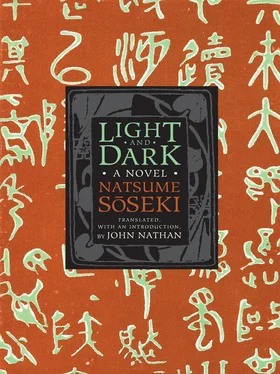
 “YOU PLAY at Okamoto’s place these days?”
“YOU PLAY at Okamoto’s place these days?” TSUDA HEARD his uncle’s voice in conversation with someone in the formal drawing room and, noticing through the lattice bars a pair of visitor’s shoes, turned away from the main entrance at once, without opening the front door, and made his way around the house toward the sitting room. The garden that might have been at one time a nursery was neither protected by a wooden gate nor enclosed inside a bamboo fence, so one had only to circumvent the kitchen entrance to a rental house that recently had been erected on the same property to reach the far end of the engawa that ran the length of the house on this side. Passing two or three tall tea bushes that were nonetheless a bit low to afford privacy, and beneath the persimmon tree that remained always vivid in his memory, he discerned his aunt’s figure in its customary place. As a reflection of her profile appeared in the glass set into the shoji, he called to her from outside.
TSUDA HEARD his uncle’s voice in conversation with someone in the formal drawing room and, noticing through the lattice bars a pair of visitor’s shoes, turned away from the main entrance at once, without opening the front door, and made his way around the house toward the sitting room. The garden that might have been at one time a nursery was neither protected by a wooden gate nor enclosed inside a bamboo fence, so one had only to circumvent the kitchen entrance to a rental house that recently had been erected on the same property to reach the far end of the engawa that ran the length of the house on this side. Passing two or three tall tea bushes that were nonetheless a bit low to afford privacy, and beneath the persimmon tree that remained always vivid in his memory, he discerned his aunt’s figure in its customary place. As a reflection of her profile appeared in the glass set into the shoji, he called to her from outside.
